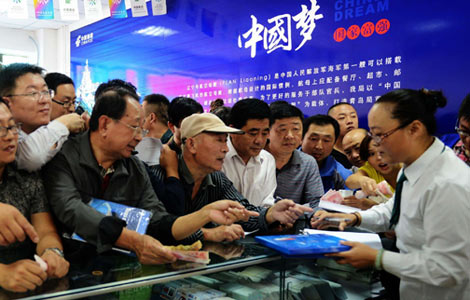Xiaomi's Barra ready to take on Beijing
Updated: 2013-10-09 09:55
By Yu Wei in San Francisco (China Daily)
|
||||||||
|
Hugo Barra (right), former Google vice-president of product management for Android, talks about his new role at Chinese smartphone company Xiaomi, with Duncan Clark, chairman of BDA China, at the annual China 2.0 investment conference held at Stanford University. Yu Wei / China Daily |
As Hugo Barra, former vice president of Android product development at Google, heads to China to oversee the global expansion of smartphone firm Xiaomi, Silicon Valley's relationship with the world's largest smartphone market is growing ever tighter.
"It is a terrific company," Barra described his new employer at the annual China 2.0 investment conference at Stanford University last week.
Barra said the most notable characteristic of Xiaomi is that its product is completely user-centric. "If you're on the data branch, you get software updates on your phone every week; if you're on the stable branch, you get software update every month. You don't see that very often in this ecosystem," he said.
Xiaomi, the Beijing-based low-end smartphone maker, overtook Apple to reach sixth place in China's smartphone market, with a 5 percent share in the second quarter, according to Canalys research firm.
However, few people outside of China have ever heard of Xiaomi. Many observers see the company's recent move of hiring Barra away from Google to head its international business development division as a sign that Xiaomi is gearing up to grow beyond China.
"There's nothing wrong with not going global for a Chinese company," Barra said. "China's domestic market is gigantic with huge opportunities. But I think going global is kind of a DNA level thing. It is the vision to want to build for a global audience."
He stressed that knowing users' needs from a local perspective is the most crucial thing for Xiaomi to enter any market outside of China.
"I think the right approach is to actually find the users," he explained. "The company needs to spend the time to get to know them, build support for them, make sure that they can be heard, that their issues and feature requests are quickly captured, before we say ‘I think we get this market, let's move on to the next one'.
"The implementation of details might change, but the philosophy of focusing on the users is the core that I think will stay, has to stay," he added.
While Samsung and Apple remained the most used smartphone brands among Chinese users, Xiaomi has outperformed HTC to take the fifth spot in China, according to the latest market survey conducted by AVANTI, a research division of TrendForce.
The survey showed that more than 60 percent of surveyed consumers have shown an interest in buying Xiaomi's Red Rice smartphone because of its high price-to-performance ratio, as well as its affordability.
"Red Rice is a product targeting value-for-money consumers. With competitive specifications and features, 100,000 units were pre-ordered within 10 minutes," said Canalys analyst Wang Jingwen. "We believe with the newly launched product line, Xiaomi will become a volume player to challenge the leaders in the Chinese market."
Wang said that since Xiaomi remains a small player in markets beyond China, it might still be too early to discuss which countries it should focus on. Canalys expects that Xiaomi will gradually expand its overseas business and the MIUI interface will be the key.
"Those countries that have a large MIUI installed base will be markets that Xiaomi will be interested in. And we do not see Xiaomi as currently well prepared to roll out its devices massively to overseas markets," Wang said, citing some of its thorniest barriers such as its credibility as a phone vendor, among both service operators and App developers overseas.
"The hire of Hugo Barra may be a prudent decision in the context that he can help raise Xiaomi's profile among Android App developers overseas and thereby help raise the MIUI ROM's profile and viability overseas, before Xiaomi's overseas sales can logically take off," she added.
Wilson Miao, an analyst from TrendForce, said that given the intense pricing competition within China's market, it has become increasingly more difficult for mid- to low-sized manufacturers such as Xiaomi to profit.
"As such, even if China remains one of the most important markets for Xiaomi, expanding to foreign markets is definitely a necessary move for the company," he said.
"The earlier Xiaomi expands into non-Chinese markets, the better. One of the key signs to watch out for is how much resources Xiaomi devotes into its foreign expansion plans," Miao said. "From what we've observed so far, most of Xiaomi's focus is still on the Chinese market."
By moving full-time to Beijing this month, Barra is looking forward to whatever comes next.
"It will be amazing," Barra said, "working with people that I know (he has known Xiaomi's president Lin Bin for years) in a company that has similar DNA to my own and with a market that is terrific and having a serious impact."
Contact the writer at Yuwei12@chinadailyusa.com

 Last photos of Hungarian wingsuit diver
Last photos of Hungarian wingsuit diver
 In photos: Typhoon Fitow aftermath
In photos: Typhoon Fitow aftermath
 Japan-US military drill raises tension
Japan-US military drill raises tension
 Higgs and Englert win physics Nobel prize
Higgs and Englert win physics Nobel prize In Bali, they relax in local fashions
In Bali, they relax in local fashions
 Post office for Liaoning carrier opens
Post office for Liaoning carrier opens
 A smog-filled Beijing targets polluting cars
A smog-filled Beijing targets polluting cars
 Animal welfare to be added in training
Animal welfare to be added in training
Most Viewed
Editor's Picks

|

|

|

|

|

|
Today's Top News
Peace is in China's DNA: says Beijing's ambassador
Trending News across China on Oct 9
Xiaomi's Barra ready to take on Beijing
A day of cultural exchange at Pace University
ZTE, Houston Rockets shooting for global markets
Global firms facing HR challenges in Asia
Back to 1942, entered for the 86th Oscars
Obama says he'll negotiate once 'threats' end
US Weekly

|

|









